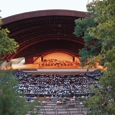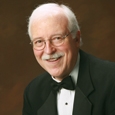Many directors encourage students to attend summer music camps as a way to keep making progress during the summer months. Few stop to consider the trail of successes and mistakes that make up the history of any camp. Here is the story of Blue Lake Fine Arts Camp, a place that faced all of the obstacles common to new ventures but has continued to make beautiful music every summer for over four decades.
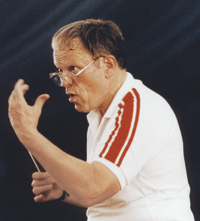 Where did you get the idea to establish a fine arts camp?
Where did you get the idea to establish a fine arts camp?
My grandfather, Ludolph Arens, was a German immigrant who came to the United States in 1899 and went to Cincinnati Conservatory to finish his musical studies. He later was a piano professor at the Lawrence Conservatory. He started a music camp in Door County, Wisconsin in 1922. He sought to keep students from going backwards in technique during the long summer months. He developed the idea of a program for piano students and eventually drama students. This was a small program, with not more than 25 students, but I spent quite a few summers there with my grandfather.
After his death in 1947, my mother inherited part of the camp, and her stepmother inherited the other part. They did not get on well and after working together for one summer, the camp closed in 1948. My mother and father dreamed of starting another camp but it didn’t happen. However, they did plant the idea of a camp in my head, and it was frequently on my mind as I went through music school, became a teacher, and met my wife at Michigan State.
Why did you locate the camp in western Michigan?
The idea at first was to reopen the camp in Wisconsin, and I looked at various possibilities, but the original camp was limited. Other available facilities were either too expensive or inadequate. I began looking in Michigan, where I taught, and found the current location 1965. It was then an old camp owned by an orphanage for boys affiliated with the Episcopal Church of Chicago. It started as a camp in 1910, but as orphanages faded, the camp closed in 1962 or so.
The site consisted of 35 buildings on 186 acres. It had potential but was so run-down that we didn’t know how we could get the money to renovate and decided not to proceed. As we continued to look, we found a place on Lake Michigan in Muskegon County. We thought it might work and got it rezoned for a summer camp. It was 50 acres with no buildings, but at that point we realized that we didn’t have the money to support our dream, so we pulled the plug on that idea. The area was soon developed with many residential homes, which would have caused many problems for a camp.
We went back to the site owned by the orphanage again and decided that if the old buildings were painted it might work. We made an offer and were surprised that the owner sold it on a land contract (which provided financing and allows payment in installments). I believe the original purchase price was $45,000 for 186 acres.
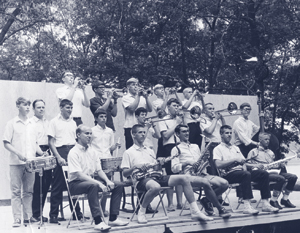 Tell us about the first summer in 1966?
Tell us about the first summer in 1966?
We massively underestimated the start-up cost of getting the facility back in order, and made every possible mistake in starting a business. When we turned on the water system in the spring, it leaked everywhere because the camp had been abandoned without properly draining the water. All of the buildings had to be painted and repaired.
We rounded up every volunteer we could find, including students from the Muskegon band and orchestra. The camp finally opened on July 5th, and 56 students showed up for the first session. About 40 were in the choir and 15 in a jazz band. Overall, there were 255 students at the two sessions of concert band, ballet, art, jazz, and choir. After the regular season ended, several marching bands came in, which added a bit of revenue. We ended the first season with a $20,000 deficit and no idea how to pay the bills.
What were some of other problems you faced?
It was difficult to find adequate staff and learn how to operate a counseling program. There were all kinds of standards to meet for the facilities to come up to the level needed for a license from the state of Michigan. The camp had all of the growth problems of any young business. The deficit kept growing each year even though our enrollment doubled.
Some things have taken more of my time than I ever expected they would. A big part of the initial struggle was dealing with boards and individual personalities. One quick example was the considerable amount of time spent arguing over whether we should serve strawberries to the kids or not, given the price of strawberries. That wasn’t what I had in mind when I started the camp.
On the positive side, though, we did not realize what a tremendous need there was for our program. No matter how many problems there were, the camp continued to succeed, and enrollment grew rapidly. The events of the era helped us. Although almost every college had a summer program for instrumental music, more and more parents did not want to send their children to a college campus in the middle of the Vietnam War.
One of the main reasons for success was an open admission policy. Many summer camps and university programs were very selective, and some insisted that students prepare tapes of a performance. This discouraged many young musicians from wanting to apply for fear of rejection. Our policy made it easier for parents. On occasion there is a waiting list, but parents know that if they apply early next year, they are first on the list. It has been our policy from the beginning that first come is first served.
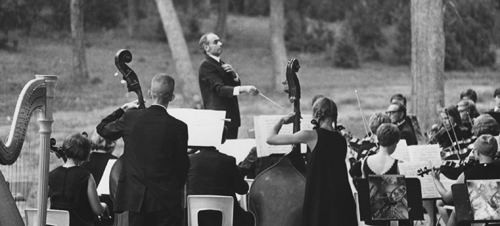
What were some other early decisions that are still an important part of the camp?
As a music teacher I thought the key was having outstanding conductors because the bulk of our students were in large ensembles. We quickly learned that with riots in Detroit and the counterculture on college campuses, what parents wanted most was a secure, safe environment for their children. As a result we emphasized a really good counseling program. My daughter, Heidi, directs the camp now and has devoted her life to this side of the program, so that we have a secure environment for students.
We try to remember that we are a summer camp, not a music conservatory or fine arts institute. The performance level is not the most important thing, motivation is. That is our philosophy: a secure environment that is fun for everybody, and first come first served. Of course, outstanding faculty is just as important.
What is the camp like today?
We accept students at any level and try to put them in a group that is motivating and challenging. The program is like a pyramid, with large numbers of students on the beginning level and smaller numbers as you go up the pyramid, until professional players are at the very top, along with faculty and staff.
There are five concert bands each two-week session, so over the course of the summer there are 20 concert bands on site, plus two concert bands that tour in Europe. Most of the programs are similar in structure except the piano program, which is taught one-on-one. The piano program is modeled after my grandfather’s philosophy that each student should have a private lesson and supervised individual practice every day. The piano and harp programs are lesson-based, but all the other programs have a certain amount of ability grouping. For example, in the ballet program, they divide into several levels at each session, and some of the sessions are more advanced than others.
The orchestra, jazz, and choir programs are similar to the band pyramid. In the orchestra program, there are four or five ability-grouped orchestras in each session. Each student in instrumental music plays in a technique class, a sectional, and a full ensemble every day. The choirs are similar with three levels. In theater there is Shakespeare, musical theater, and acting and movement.
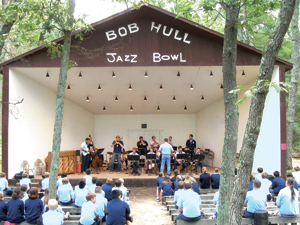 Why does the program emphasize rehearsals with full ensembles?
Why does the program emphasize rehearsals with full ensembles?
Over the years we have had many interesting discussions between those who teach in public schools and those who are at the university level. I’ve had teachers state that we don’t need to have large groups and should focus on private lessons and chamber music for students to make the kind of progress that they need. This is probably technically correct, but the experience of being in a large performing group and the social aspects associated with that are what motivates the students.
To this day some teachers on the faculty comment that they love being at Blue Lake, but suggest that we spend less time in full rehearsals and more working with students individually. We have adjusted the program some, but in each major they have two full rehearsals a day, each for 90 minutes as well as a technique class for an hour. At the end of the session, each program gives a final performance.
To understand how the arts relate to each other, students are encouraged to take an elective in another area, such as art, dance, or theater, or trying a new instrument. In the evening there are cabin activities and camp fires, and the whole camp comes together for performances and recitals.
The camp has a small replica of The Globe theater, and every student sees a brief presentation of Shakespeare. The faculty members and professional singers also perform live opera for the students. This summer it will be an abridged version of La Boheme with only seven cast members. They will perform the first and last acts, with Musetta’s Waltz as a bridge in between. This makes the whole thing only an hour and 15 minutes and a good first opera experience for students.
When this program started five years ago, we were apprehensive about how students would behave. We performed James Niblock’s opera, Ruth, based on the Bible story. When the orchestra started playing, it was completely silent, and the students watched attentively all the way through. They were a marvelous audience, and it has been that way ever since.
How did the international program begin?
I was the band and orchestra director at North Muskegon high school. There was an active exchange program, called Youth for Understanding, in the community, that began soon after WWII ended as a way to help students readjust after the war. In 1951, 75 German teenagers came to Michigan and stayed with American families. Later, American students travelled to Europe, and the program grew.
My wife, Gretchen became interested in the program, and we went as counselors in 1963. Gretchen was absolutely smitten by the idea and philosophy and continued to work with the program. There was some interest in sending a band to Europe through the organization, but nothing ever came of it.
When we started the camp, the idea of sending a group to Europe was in the back of our minds, and it proved to be a natural outgrowth of the camp. Gretchen is the one who made it happen. She had contacts with people we had met through the Youth for Understanding program.
In the fall of 1964 I had a very fine young German student in my school band. He was a violinist but wanted to play in band with his host brother. We put him on cymbals, and I still remember trying to teach this kid who had never heard the Star Spangled Banner how to get the cymbal crashes right.
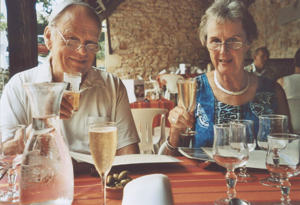 After the camp started, we contacted him, and he put us in touch with his cousin, a colonel in the German Air Force. He was an enormous help in getting this program off the ground. Gretchen had not studied a foreign language, but she had the ability to pick up languages quickly, so she soon became quite proficient in German and able to conduct meetings in French. Even so, it took a lot of salesmanship to sell this idea of an exchange between European youth groups and our own. Gradually, it grew.
After the camp started, we contacted him, and he put us in touch with his cousin, a colonel in the German Air Force. He was an enormous help in getting this program off the ground. Gretchen had not studied a foreign language, but she had the ability to pick up languages quickly, so she soon became quite proficient in German and able to conduct meetings in French. Even so, it took a lot of salesmanship to sell this idea of an exchange between European youth groups and our own. Gradually, it grew.
Today, students at Blue Lake have the opportunity to interview if they are interested in being a part of the international program. One of the keys to the program’s success has been to look for mature students who want this kind of experience and just happen to play an instrument at a reasonably good level. We want students who will be good ambassadors – they behave well and understand the importance of international exchange. The ability to play as well as possible ranks below that.
The students who are invited and enroll are given a schedule of when they need to come to camp. The first rehearsal typically takes place in mid-November. Because of problems with snow in Michigan, they do not rehearse in winter, but they use technology to stay in touch and then come back in April for one rehearsal. Then they rehearse over a long weekend in May, but most of the work takes place during a June Intensive Week. The groups come together for ten days in early June with rehearsals and sectionals all day long plus orientation and some language classes. We watch that the conductors do not become obsessed to the point of wearing students out. Pacing is important.
What is the role of the camp’s radio station?
The radio station began in 1982 and is a very important part of the camp and does so much for the public relations side, at least locally. For some reason, our part of west Michigan had no public radio at that time. In Muskegon there was a gentleman who had a radio program for one hour a week, which was the only good music to listen to in the area. He used his own records to do the program. There was an obvious need, so we tried it out. The station has classical programming and some jazz. One bias of mine is that I don’t like to hear parts of pieces played on the radio, so the radio staff is not permitted to pick movements but just let the whole thing play. I suspect that if they want a coffee break they put on a Mahler or Bruckner symphony.
What is next for Blue Lake?
The quick answer is steady as she goes. This is a difficult time, and we are being very careful with our budget. Enrollment is good, and participation in all programs is excellent. There are many different places we could put every dollar, but we are just working hard at the status quo at this point.
Marching band camp used to be important, but it has fizzled out because the summer is filled with other activities. Marching bands used to come in late August, but now they want to go in the middle of the summer when our other programs are in session.
We have an incredible number of people who work so hard to make things succeed, and sometimes my mouth just drops open when I hear the level of some of our performing groups. I think back to those opening few years; the first five years were so touch-and-go. In fact there was one point when Gretchen and I were both ready to do something else. I’m pleased that so many parents have the confidence in us to send their children, and that students come back in large numbers. They have a good time and make enormous progress. We hear from band and orchestra teachers about how students who attend Blue Lake come back highly motivated and become leaders in their school groups. That makes me really proud.
